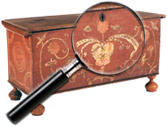|
|
Hummel marks Hummel Figurines
History
Berta Hummel (May 21, 1909 to November 6, 1946) was born Massing, Bavaria, and the young girl exhibited artistic talents early, drawing little sketches with images of her friends or things she observed in nature. Her family encouraged her abilities, and by 1927, she enrolled in Munich’s Academy of Fine and Applied Arts. While still a student, Berta became friendly with two Franciscan nuns who were members of [...] Click here to continue reading.
The Sarcophagus in Decorative Arts
Derived from the Greek sarx, meaning flesh, and phagein, meaning eat, a sarcophagus is, essentially, a container for a body, much like a coffin or casket. Historically, sarcophagi were typically made of stone (though sometimes of other materials, such as wood or metal), with a relief-carved or pediment top, and designed to be above ground, and have been used by many cultures since ancient times.
An ancient [...] Click here to continue reading.
Newcomb College Art Pottery
Before it was revered for its art, and more specifically for its art pottery, Newcomb College was the country’s first degree-granting college for women within a major university. Its founder, Josephine L. Newcomb, envisioned an environment in which women would learn both practical skills and academic knowledge when she proposed the creation of the college in the memory of her daughter H. Sophie Newcomb, who died at 15. New Orleans’s [...] Click here to continue reading.
Cassolette
“Cassolette,” the diminutive form of the French word “cassole,” means small container. While the word has other meanings, in the world of decorative arts, it refers to a small covered vase meant to hold perfumed substances or incense. A cassolette normally has holes pierced in the shoulders and in the cover to allow the scent to drift out. Frequently, mounted vases that were not originally designed as cassolettes have had a pierced metal [...] Click here to continue reading.
Dave Drake, the Slave Potter
The potter known as Dave the Slave was born circa 1800 in an area devoted to pottery making. The Edgefield District of South Carolina had the clay, workforce and demand to make it the area’s pottery capital. Large pottery factories dotted the district, most operating with slave labor. Their products were essential to life on the early to mid-19th century plantation where pottery served as refrigerator, Mason jar and [...] Click here to continue reading.
Gemels
The pottery form known as a gemel, also gemel jug or gemel bottle, is one of the rarest forms in American stoneware. The word is derived from the Latin word “geminus,” meaning twin, double, paired, or half-and-half. The plural of this same word, “gemini,” is used to refer to the constellation composed of twin brothers, Castor and Pollux, of Greek mythology. The words “twin” or “double” definitely come to mind when one thinks [...] Click here to continue reading.
Clarice Cliff (1899-1972)
Colorful & Quirky Ceramics
The Newport Pottery Bizarre Girls created bold Art Deco ware. Clarice Cliff’s hugely popular Art Deco era pottery features simple, streamlined forms decorated in brilliant colors and eye-catching patterns.
Clarice Cliff, one of eight children in a pottery making family grew up in the heart of Staffordshire pottery country in England. By the age of 17 she was working as a decorator at Wilkinson’s Royal Pottery where [...] Click here to continue reading.
Shimuel Timmerman, potter
Shimuel was a man of the times. He was a Justice of the Peace, fought in the Creek Indian War, and was a Confederate soldier. His only sibling, John, died as a POW at Camp Douglas, Illinois. His two sons continued to run the business after their father passed on. He is buried at the Wayfare Primitive Baptist Cemetery, Cow Creek, Echols County, Georgia. (Information provided to p4A by a granddaughter [...] Click here to continue reading.
Herend Porcelain
The Herend Porcelain Manufactory was started in 1826 in Hungary by Vince Stingl, he started by making earthenware pottery, but by 1839, went bankrupt and his creditor Mor Fischer took over the factory. Fischer started artistic porcelain manufacturing in this year. Herend subsequently became very successful, being popular with much of the European aristocracy and nobility. His sons took over the operation in 1874 and the company continues to produce fine hand-crafted [...] Click here to continue reading.
Brother Thomas Bezanson
Brother Thomas Bezanson was a Canadian-born artist who is best known for his finely thrown porcelain vessels and complex glazes. After studying philosophy at the University of Ottawa, he spent twenty-five years as a Benedictine monk at Weston Priory, Vermont, before becoming the artist-in-residence at Mount Saint Benedict in Erie, Pennsylvania. Bezanson believed in art as the language of the spirit, and he approached pottery as a monk would their daily [...] Click here to continue reading.
|
Recent Articles
- Charles Alfred Meurer – American Artist & Tromp L’Oeil Artist
- Sendak, Maurice – American Artist & Writer
- Godie, Lee – American Artist
- Davis, Vestie – American Artist
- Bartlett, Morton – American Artist
- Mackintosh, Dwight – American Artist
- Evans, Minnie Jones – African-American Artist
- Mumma, Ed (Mr. Eddy) – American Artist
- Nice, Don – American Artist
- Savitsky, John (Jack) – American Artist
- Gordon, Harold Theodore (Ted) – American Artist
- Dial, Thornton – African-American Artist
- Doyle Sam – American Artist
- Johnson, Lester Frederick – American Artist
- Finster, Howard – American Artist
|
|
